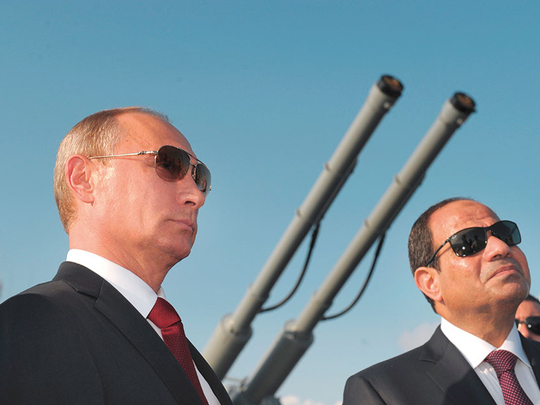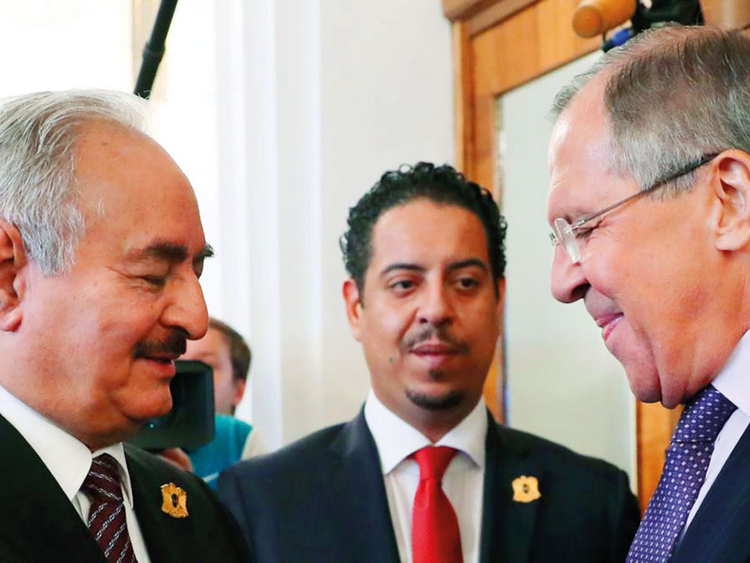
LONDON: Egypt, in what appeared to be a snub to the Trump administration, has reached a preliminary agreement to allow Russian military jets to use its airspace and bases, both sides said on November 30.
If finalised, the agreement would give Russia its deepest presence in Egypt since 1973, when Cairo expelled the military of the Soviet Union and instead became Washington’s closest Arab ally.
The United States has provided Egypt more than $70 billion (Dh257 billion) in aid in the four decades since, at a rate of more than $1.3 billion a year in recent years. The cost is often justified in part by the argument that it secures the use of Egypt’s airspace and bases for the US military.
Egyptian and US analysts called the preliminary deal the latest sign of the waning influence of US as President Donald Trump has diminished its military and diplomatic footprint in the region and the world.
“Power abhors a vacuum and when US pulls back we can’t be under the impression that the world is going to stand by and wait for us,” said Matthew Spence, a former deputy assistant secretary of defence for Middle East policy under the Obama administration, which faced similar criticism for its policy toward the region. “The danger, and the reality, is that other countries will take advantage of the opportunity presented when America chooses to pull back.”
In practical terms, the presence of Russian jets in Egypt would raise concerns about the operational security of US military personnel and require coordinating with US military planes in the same airspace.
“It’s a major problem for the United States-Egypt defence relationship,” said Andrew Miller, a former senior State Department official who is now at the Project on Middle East Democracy.
It was unclear to what extent Washington was informed about the agreement. The Trump administration has not yet replaced the ambassador to Cairo, whose three-year term ended in July.
Edgar Vasquez, a State Department spokesman, said only, “We are aware of these reports and are monitoring the situation.”
News of the preliminary agreement came as US diplomatic corps has been severely reduced and American foreign policy is facing challenges from all corners.
North Korea had tested its longest-range missile yet the day before, in defiance of bellicose warnings from Trump and at a time when the positions of assistant secretary of state for East Asia and US ambassador to South Korea both remain empty.
The prime minister and Parliament of Britain, Washington’s closest ally, have publicly rebuked Trump for promoting online videos from a British far-right group demonising Muslims.
In the Middle East, the administration has no assistant secretary of state for Near Eastern affairs or ambassadors to Saudi Arabia, Turkey, Jordan, Egypt or Qatar. And on November 30, a White House plan surfaced to oust Secretary of State Rex Tillerson, who had presided over the mass resignations of senior diplomats while watching his authority undermined by repeated contradiction or belittling from the Oval Office.
The Obama administration had been criticised by allies for retreating from the Middle East, in particular for failing to intervene aggressively enough against the Iranian- and Russian-backed government of President Bashar Al Assad of Syria in his civil war against rebels challenging his rule.
Under Trump, the United States has further reduced its support for Syrian rebels, backed off its one-time goal of removing Al Assad from power and taken a back seat to Moscow in the Syrian peace process.
President Vladimir Putin of Russia has stepped in, expanding Moscow’s influence in the Middle East and seeking to regain influence lost with the collapse of the Soviet Union, the end of the Cold War and the expansion of America’s military presence around the Arabian Gulf and elsewhere.
Russia has carried out an aggressive air campaign in Syria that has fortified Al Assad, cementing his position as a client of Moscow and protecting a Russian naval base on Syria’s Mediterranean coast.
Russia has sought to make inroads with US allies as well. In September, it agreed to sell $2 billion worth of advanced missiles to Turkey, a Nato member that previously clashed with Russia over its Syria policy. In October, Russia agreed to sell $3 billion worth of missiles to Saudi Arabia, another close US ally on the other side of the Syrian conflict.
With Washington seemingly in retreat, “very few if any of the states in the region are willing to rely solely on alliance with the United States and depend on the United States as the insurance policy for their security,” said Jamal Abdul Jawad Sultan, a scholar at the Al Ahram Centre for Political and Strategic Studies, a state-financed research institute in Cairo.
In contrast, he said, “Russia has proven to be quite effective, and that has been attractive to countries around the region.”
Egypt, under the rule of Jamal Abdul Nasser, tried in the early 1950s to build counterbalancing alliances with the United States and the Soviet Union. But Washington soon lost patience with Nasser’s non-alignment policy and his anti-colonialist speeches, and Egypt fell more fully into the camp of the Soviets until the 1970s, when President Anwar Sadat switched his allegiance to the West.
Egypt’s current president, Abdul Fattah Al Sissi has been rekindling Cairo’s Cold War alliance with Moscow. US officials believed he may have been trying to press Washington to keep delivering more aid of its own, a variation of Jamal Abdul Nasser’s strategy of playing off global rivals.
But US officials have scoffed at the idea that Russia could provide the kind of military support the Soviet Union once promised, much less replace the supplies, training and maintenance that the Egyptians have come to depend on from Washington.
“Egypt would often hold out Russia as an alternative to American cooperation, and our attitude to some degree was, ‘Good luck with that!’” said Spence, the former Defence Department official.
But when the Obama administration temporarily suspended military aid to Egypt in 2013 in response to the government’s mass shootings of more than a thousand of his political opponents, Al Sissi visited Moscow and agreed to buy $3.5 billion in jets, helicopters and missiles from Russia. Last year, the two countries held joint antiterrorism drills, with Russian paratroopers conducting training exercises in Egypt with Egyptian paratroopers.
Egypt also signed a preliminary agreement for Russia to build nuclear power facilities in Egypt, although there has been no sign of any construction.
It was not immediately clear what Egypt hoped to receive in return for allowing Russia to use its airbases or airspace. A draft agreement released by Moscow on Thursday gave Egypt only reciprocal rights to use Russian airspace or airbases, suggesting that Russia sought to obtain for free advantages for which the United States has being paying dearly for decades.
Some analysts speculated that Cairo might hope to persuade Moscow to restore tourist flights that it cut off because of security concerns after militants downed a Russian chartered jet leaving the resort of Sharm Al Shaikh two years ago.
Egypt may also hope to persuade Russia to move ahead with the preliminary deal to build a nuclear power plant. “There is a long history of Russian preliminary agreements that take forever or never occur,” said Miller, the former State Department official.
Russian state media suggested that the agreement might help Moscow’s military campaign in Syria, another area where Putin and Al Sissi have found common ground.
Egypt’s Gulf allies have viewed the fight against the Al Assad regime as a proxy war against its regional ally, Iran. But Al Sissi has sometimes shown sympathy for Al Assad and seen him as defending the status quo and fighting political Islam.
Vladimir Fitin, head of the Near and Middle East Centre at the Russian Institute for Strategic Studies, said that access to Egyptian airports would allow Russian military aircraft to refuel on their way to Syria, according to a report by RIA Novosti, a state-controlled Russian news service.













